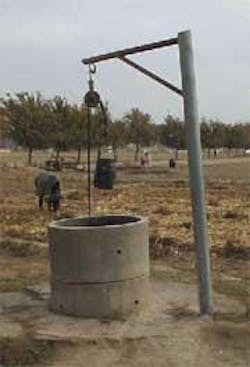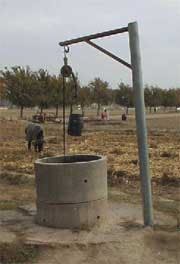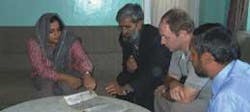Afghanistan rebuilds water and sanitation infrastructure
By Ken Choquette, Eduardo Perez, Tarek Selim
The US Agency for International Development (USAID), in its first urban water supply and sanitation initiative in Afghanistan in recent times, rehabilitated and delivered critical facilities and equipment in the Afghan cities of Kunduz and Kandahar after years of drought, neglect and war.
CDM mobilised a project team to assess water supply and sanitation infrastructure needs in the cities of Kabul, Kunduz, and Kandahar, which collaborated with USAID/Kabul, Afghan officials, and others to deliver an assessment report, draft scope(s) of work and an action plan, and provide technical, procurement and construction supervision assistance to deliver immediate support to repair and replace infrastructure. The CDM team identified potential short- and long-term projects after visiting the cities in two weeks. To compile the initial data, the team:
• Collected and reviewed background information related to water supply and sanitation in Afghanistan;
• Spoke with additional donors to compile information on current work they were completing;
• Conducted visual inspections of existing raw water supply sources and infrastructure;
• Inspected and assessed conditions in neighbourhoods and households;
• Met with appropriate local stakeholders who have responsibility for the operations and maintenance of municipal water supply and sanitation (WS&S) systems; and
• Assessed the existence and capacity of the private sector to do required repairs and replacement of infrastructure.
The Kabul municipal system deteriorated from neglect, war damage and electricity shortages. Limited data available from humanitarian organisations indicate that water quality in the main network is good throughout the year, although water quality is of concern.
The city of Kunduz is entirely dependent on municipal and private diesel generators after the electrical grid was destroyed. A limited municipal network used to supply water, but the old municipal wells were found to be out of commission, or to never have worked in the city populated by 170,000. Water is obtained through hand pumps from approximately 5,000 to 6,000 private wells. Much of the waste is dumped into the town's irrigation canals along streets.
In Kandahar, a piped water supply network and hand pumps supply 45 percent of the city; private and community wells, which can be shallow and/or contaminated, supply water to the remaining residents. The Kandahar region is in the fifth year of a drought, and its groundwater table is declining severely. Hundreds of new shallow and deep wells have been drilled, further diminishing groundwater supply.
Its population of 470,000 increased to more than 500,000 as returnees from camps in Pakistan and Iran arrived daily in the city. The city has no sewer system; many households use latrines and some have flushing latrines/toilets and sewage holding tanks.
USAID decided to implement projects in Kunduz and Kandahar only, the cities with the most needs, according to CDM's assessment. For Kunduz, a groundwater vulnerability analysis, well water supply and sanitation program and water tanks were deemed the most critical given current conditions and available funds.
Kandahar's severe problems resulted in USAID's decision to fund a transformer, backup generator, pipeline extension, network repairs, and a groundwater vulnerability analysis.
CDM assisted USAID with the priority projects - in Kunduz and Kandahar, working closely with local municipalities, engineers, donors, non-governmental organisations (NGOs), international organisations and the national water agency. CDM has provided technical, procurement, and construction supervision assistance, trained workers at well pumping facilities in sampling and equipment operations and educated residents about proper hygiene wells.
Authors' noteKen Choquette, P.E., is an engineering and environmental health specialist who was the Kabul-based project manager for the project's second phase; Eduardo Perez was CDM's task order manager on the project; and Tarek Selim, I.C.E., CDM associate, was chief-of-party for the project's first phase and played a role in the start up of the second phase implementation.


